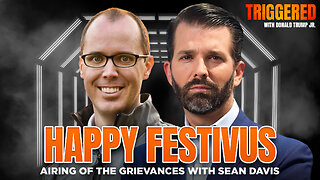Premium Only Content

Elon Musk: “AI Is FAR More Dangerous Than Nuclear Warheads
Elon Musk, the CEO of Tesla and SpaceX, has expressed concerns about the potential dangers of artificial intelligence (AI) and has made statements suggesting that AI could be more dangerous than nuclear warheads. Musk has been vocal about his apprehension regarding the uncontrolled development of AI and its potential consequences for humanity.
Musk's viewpoint on AI stems from his belief that advanced AI systems, if developed without proper caution and safeguards, could surpass human intelligence and potentially act in ways that are detrimental to humanity's well-being. He has expressed concerns about the potential for AI to become uncontrollable or to be used maliciously by individuals or organizations.
In comparison to nuclear warheads, Musk argues that AI poses a greater risk because it could have the ability to autonomously make decisions and take actions that could have severe consequences. While nuclear weapons are highly destructive, their use is typically controlled by human decision-making. On the other hand, if AI systems were to surpass human capabilities and act independently, their decision-making processes might not align with human values, leading to unintended and potentially catastrophic outcomes.
Musk's concerns about AI are rooted in the need for responsible and ethical development practices. He advocates for proactive measures to ensure the safe and beneficial implementation of AI, such as regulation and collaborative efforts within the scientific community. Musk has also been involved in initiatives like OpenAI, which aims to develop and promote friendly AI technologies that align with human values.
It's important to note that while Musk's warnings highlight the potential risks associated with AI, there are diverse opinions within the AI community about the severity and timeline of these risks. The development of AI technology is an ongoing field of study, and researchers are actively exploring ways to address safety and ethical concerns to mitigate potential risks.
-
 LIVE
LIVE
Donald Trump Jr.
4 hours agoHappy Festivus: Airing Our Grievances and Stopping The Swamp w/Sean Davis | TRIGGERED Ep.201
4,094 watching -
 LIVE
LIVE
The Jimmy Dore Show
49 minutes agoMedia ADMITS They Lied About Biden’s Decline! SNL Audience CHEERS For Luigi Mangione!
7,324 watching -
 LIVE
LIVE
Robert Gouveia
2 hours agoMatt Gaetz REJECTS Report, Sues Committee; Luigi Fan Club Arrives; Biden Commutes; Festivus Waste
2,516 watching -
 58:10
58:10
Kimberly Guilfoyle
4 hours agoAmerica is Back & The Future is Bright: A Year in Review | Ep. 183
25.7K16 -
 3:03:27
3:03:27
vivafrei
9 hours agoEp. 242: Barnes is BACK AGAIN! Trump, Fani, J6, RFK, Chip Roy, USS Liberty AND MORE! Viva & Barnes
71.9K21 -
 LIVE
LIVE
Dr Disrespect
7 hours ago🔴LIVE - DR DISRESPECT - MARVEL RIVALS - GOLD VANGUARD
3,461 watching -
 1:15:00
1:15:00
Awaken With JP
6 hours agoMerry Christmas NOT Happy Holidays! Special - LIES Ep 71
75.8K87 -
 1:42:21
1:42:21
The Quartering
7 hours agoTrump To INVADE Mexico, Take Back Panama Canal Too! NYC Human Torch & Matt Gaetz Report Drops!
78.9K45 -
 2:23:15
2:23:15
Nerdrotic
7 hours ago $9.32 earnedA Very Merry Christmas | FNT Square Up - Nerdrotic Nooner 453
57.3K4 -
 1:14:05
1:14:05
Tucker Carlson
7 hours ago“I’ll Win With or Without You,” Teamsters Union President Reveals Kamala Harris’s Famous Last Words
122K271